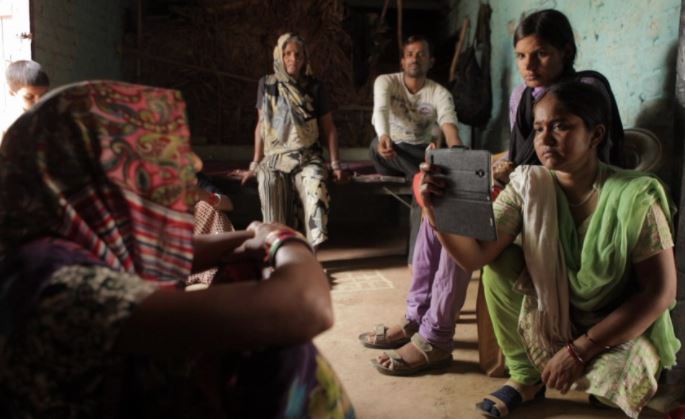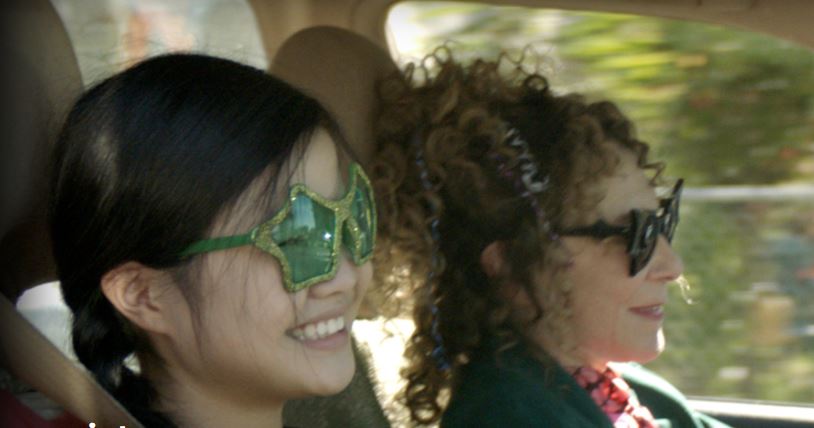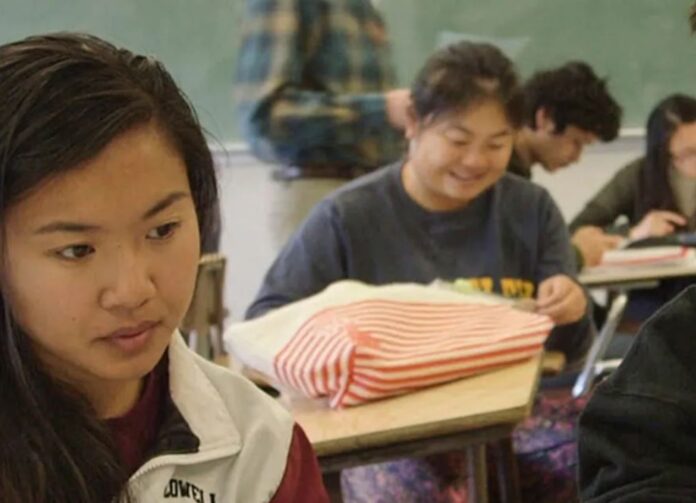From Try Harder
By Jana Monji, AsAmNews Arts & Culture Writer
Those looking for a glimpse of the Asian and Asian American films at Sundance got a good taste during a conversation with Asian filmmakers and actors hosted by the Asian Society of Northern California.
Janet Yang, Academy Governor-at-Large and executive producer of The Joy Luck Club film, spoke with writer Amy Tan, actress Miya Cech, director Sushmit Ghosh, director Debbie Lum, actor Leonardo Nam, director Baz Poonpiriya, director Rintu Thomas and director Christopher Yogi.
Debbie Lum, director of Try Harder! noted that her documentary on the agony and angst of college admissions, looked at this topic through the lens of parents. That was easy to do now that she’s the mother of three kids. In the background, during the filming the lawsuit against Harvard University was being fought in the courts, giving the general feeling that declaring one was Asian American on one’s college application was a detriment.
Try Harder! made its world premiere on 30 January 2021 at Sundance and is in the US documentary competition.
Amy Tan was the subject of James Redford’s Amy Tan: Unintended Memoir. Redford, 58, son of Sundance Film Festival’s founder, Robert Redford, was working on the documentary when he died of cancer (16 October 2020).
James left enough notes to guide the production team in the completion of this documentary which will be shown on the PBS American Masters during May as part of Asian Pacific Islander Heritage Month.
Tan resisted the documentary attempts initially, saying “I’m trying to get away from public attention.” James “was just so damn charming.” He was “courting me.”
Because they were friends and because he was already in a lot of pain, “our conversations were really deep. I forgot at times we were making a film.” Tan also felt, “I could trust that he was going to take all those elements of my life” and make a product that would be truthful, but sincere.
“I always think of The Joy Luck Club as my mother ‘lite.’ She was not a tiger mom; she was a suicidal mother. It was, ‘Try harder or I will kill myself.'” The film also looks at the trauma within her family, including sexual abuse in order to “illuminate” her life to see why she became a writer. “You cannot write simply about trauma as the only theme in a story.” What is important is “how we take pain and suffering and make something greater.”
Besides using archival footage from previous interviews, James Redford interviewed Tan’s best friend, her husband and her editor.
Amy Tan: Unintended Memoir makes its world premiere 2 February 2021 at Sundance and is scheduled to air on PBS in May.

In their feature debut, Writing with Fire, co-directors Sushmit Ghosh and Rintu Thomas look at a group of Dalit women who run India’s only all-female news network, Khabar Lahariya. The news agency was switching from print to digital in order to stay relevant.
Thomas said, Writing with Fire is an intimate portrait of these news reporters’ lives, in a media landscape that is dominated by men, in a world where they navigate against both caste prejudices and sexism. These women have been “absolutely invisible.” They show how you can negotiate with people who don’t agree with you.
Ghosh noted that the women’s hopeful attitudes were infectious, despite being the midst of these most difficult circumstances. The difference between hope and despair is a different way of looking at the truth.
The second panel was for the narrative features. Miya Cech and Leonardo Nam star in Marvelous and the Black Hole. Christopher Yogi wrote and directed I Was a Simple Man. Baz Poonpiriya wrote and directed One for the Road. All three movies deal with death.
Writing with Fire makes its world premiere on 30 January 2021. 
The second panel was for the narrative features. Miya Cech and Leonardo Nam star in Marvelous and the Black Hole. Christopher Yogi write and directed I Was a Simple Man. Baz Poonpiriya wrote and directed One for the Road. All three movies deal with death.
Cech confessed that unlike her character who loses her mother, “I haven’t really experienced something like that.” For her acting is like putting on clothes and she said it was “difficult to find where the anger was rooted from.” The film’s biggest message is hope. “You can find your way. It may seem impossible to find that light at the end of the tunnel, but if you keep digging, you’ll get there.”
Nam said that although he “came in late into the process” as a replacement, he was very happy to get on board. Nam contacted the actor who had to withdraw due to “an unfortunate event,” having known him for many years and was able to do with his blessing. The story is about how “when someone has passed and the unit of the family changes.” The film “celebrates love and diversity.”
What he hopes people will take away from the film is that “no matter what happens in life, you can still find love.”
Nam noted that for a long time, Asian Americans were seen as supporting characters. “Our stories, our voices were seen in a homogenous way, as the model minority, best friend or butt of a joke. ” What we’re seeing now is the industry opening up and realizing that Asians and Asian Americans are not a “niche market.” Films like “Marvelous and the Black Hole” provide lead characters “who look like us” and helps amplify voices that haven’t been heard.
Marvelous and the Black Hole makes its world premiere on 31 January 2021.
Yogi said his motivation behind making I Was a Simple Man was to show his home state, Hawaii, in a new light. He wants the audience to “consider the rich history and culture of the island.” The film was “inspired by my personal experience with death in the family.” His father and grandfather died of cancer. Another grandfather committed suicide. He also wanted to express the “intense connection” with the spiritual he feels in Hawaii. Working with some production members for about a decade he tries to allow “the film to reveal itself.”
I Was a Simple Man made its world premiere on 29 January 2021.
Writer/director Poonpiriya said that when he initially began working under producer Wong Kar-wai, he was working on a different project, a totally different story. Nine months in, Wong told him, “I don’t think you believe in this story; I want you to do something more personal.” Having started as a TV commercial director, Poonpiriya was used to “just getting the subject from the producer and just trying to make it work.” Doing something personal was a “really big challenge” because he had never done something personal before. The day he finished the script, he learned an old roommate from his time in New York had been diagnosed with cancer. This mirrors the theme of the film. A teary-eyed Poonpiriya said his team tried “so hard to finish the movie for him” but the friend unfortunately died before it was finished. Although Poonpiriya confessed he thought his life was not so interesting, writing and making the film “put some closure with some issues in my life.”
One for the Road made its world premiere on 28 January 2021.
On 1 February 2021, the Asia Society begins a new series that will showcase films and filmmakers from across Asian and the diaspora. Monday will feature the 2021 Academy Award submission from Hong Kong, “Better Days.” For more information, visit AsiaSociety.org.
AsAmNews has Asian America in its heart. We’re an all-volunteer effort of dedicated staff and interns. Check out our new Instagram account. Go to our Twitter feed and Facebook page for more content. Please consider interning, joining our staff, or making a financial contribution to support us.


